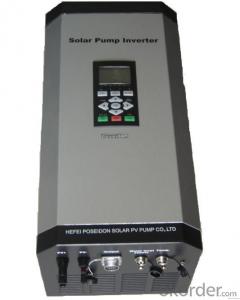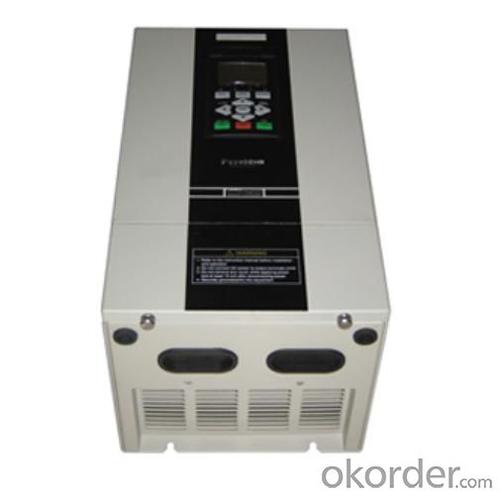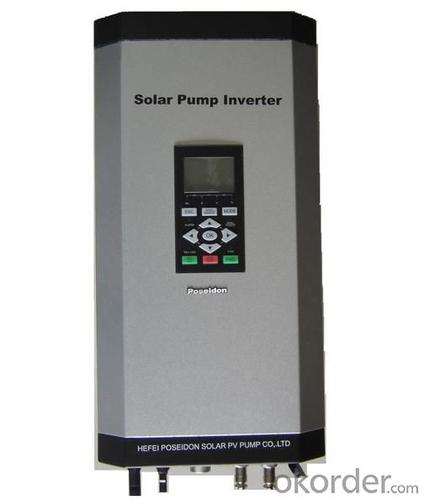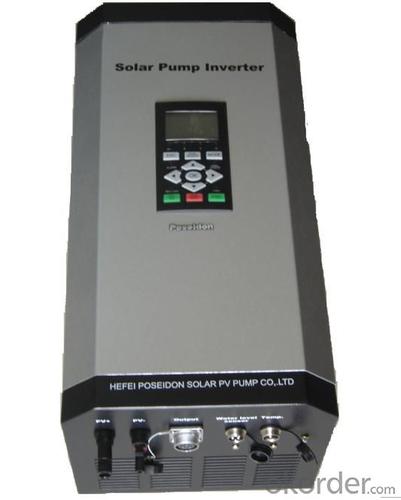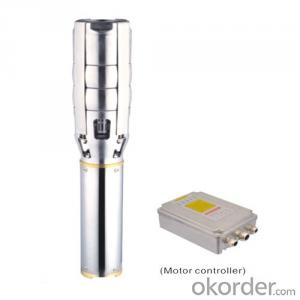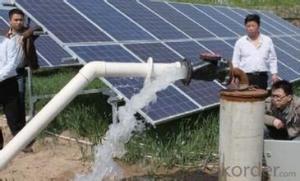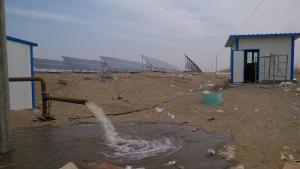RPS 400 Solar Pump FCPM11KH Inverter
- Loading Port:
- China Main Port
- Payment Terms:
- TT OR LC
- Min Order Qty:
- -
- Supply Capability:
- -
OKorder Service Pledge
Quality Product, Order Online Tracking, Timely Delivery
OKorder Financial Service
Credit Rating, Credit Services, Credit Purchasing
You Might Also Like
Solar pump inverter FCPM11KH Product Description:
Solar water pumping system is constructed with solar panel array,solar pump inverter and AC water pump, DC current produced from solar panel will be delivered to solar pump inverter,and it will convert it into AC current to drive water pump,and will automatically regulate output frequency according to sun radiance intensity,maximally realize MPPT tracking function.
Features
Adopting the proposed dynamic VI maximum power point tracking (MPPT) control method, with fast response, and reliable operation, achieves efficiency of 99%.
Designed with variable frequency driver, greatly improves efficiency
Extremely high efficiency
Digital mode control, with automatic operation and manual operation mode options
Complete protection functions
Adopts intelligent IPM module, with high reliability
LCD display and operation panel, in real time presents operating data
Optional for water level measurement and control circuit
Applicable for general ACC pumps, like centrifugal pump, piston pump etc.
Independent intellectual property; Highly effective, the redundant reliability, exempts the maintenance and the long life.
The pumps are soft started, fully protected.
No batteries are used. So better Sunlight, more water.
Datasheet.
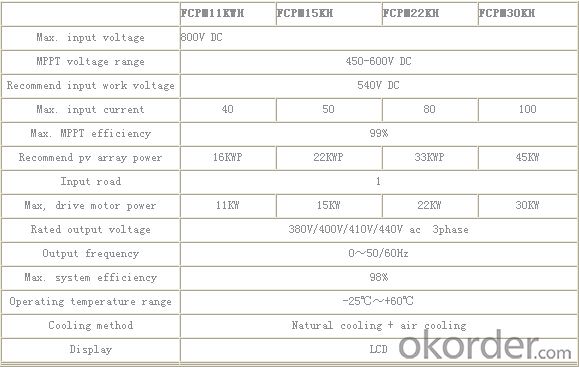
- Q: Can a solar pump be used in remote monitoring systems?
- Certainly, remote monitoring systems can make effective use of solar pumps. Solar pumps are specifically designed to operate efficiently by utilizing solar energy, making them an excellent choice for areas with limited or no access to electricity. Integrating these pumps into monitoring systems allows for remote tracking and management of water usage, pressure levels, and other relevant parameters. By utilizing sensors and data transmission technologies, the performance of the solar pump can be monitored and controlled from a central location, providing real-time updates and alerts in the event of any issues. This not only ensures the pump operates efficiently but also enables timely maintenance and troubleshooting, even in remote locations. In summary, incorporating solar pumps into remote monitoring systems provides a sustainable and cost-effective solution for managing water in remote areas.
- Q: Can a solar pump be used in areas with high levels of nitrites in the water?
- Yes, a solar pump can be used in areas with high levels of nitrites in the water. However, it is important to note that the solar pump itself does not directly address the issue of high nitrite levels. It is primarily designed to pump water using solar energy. To address the nitrite levels, additional water treatment methods or technologies may be required to remove or reduce nitrite concentrations before using the water for intended purposes.
- Q: The problem of installing pressurized water pump in solar hot water outlet pipe
- after the installation of the pump shaft, the impeller should be no friction sound or stuck phenomenon, or the pump should be opened to check the reasons.
- Q: Can a solar pump be used for water supply in military camps or bases?
- Yes, a solar pump can be used for water supply in military camps or bases. Solar pumps are an excellent alternative to traditional pumps that rely on electricity or fuel, as they are powered by the sun's energy. This makes them ideal for remote locations such as military camps or bases, where access to electricity or fuel may be limited or unreliable. Solar pumps work by converting sunlight into electrical energy, which is then used to power the pump and draw water from a water source such as a well or reservoir. They are easy to install, require minimal maintenance, and have a long lifespan, making them highly suitable for military operations. Using a solar pump for water supply in military camps or bases offers several advantages. Firstly, it reduces the dependence on external sources of energy, which can be critical in situations where supply lines are compromised or unreliable. Secondly, solar pumps are environmentally friendly, as they do not produce any greenhouse gas emissions or contribute to air pollution. This aligns with the military's increasing focus on sustainability and renewable energy. Furthermore, solar pumps can be designed to operate even in harsh conditions, such as extreme temperatures or dusty environments, ensuring their durability and reliability in military settings. They can also be equipped with storage tanks to provide a continuous water supply, even during periods of low sunlight or at night. In summary, a solar pump can be an effective and efficient solution for water supply in military camps or bases. Its reliance on renewable energy, ease of installation, low maintenance requirements, and ability to operate in various conditions make it a practical choice for meeting water needs in military operations.
- Q: Are there any government incentives or rebates available for installing a solar pump?
- Yes, there are government incentives and rebates available for installing a solar pump. These incentives vary depending on the country and region, but they typically include tax credits, grants, and subsidies that can significantly offset the cost of installing a solar pump. It is advisable to check with the local government or relevant agencies to get accurate information about the specific incentives available in your area.
- Q: Can a solar pump be used for dewatering applications?
- Dewatering applications can indeed utilize a solar pump. These pumps are designed to prioritize energy efficiency and environmental friendliness, making them an excellent option for dewatering tasks. They have the capability to extract excessive water from various areas, including construction sites, basements, mines, and agricultural fields. By harnessing the power of the sun, solar pumps generate electricity, which then enables the removal of water from the desired location. Solar panels are typically integrated into these pumps to capture sunlight and convert it into usable energy. Moreover, they are user-friendly, operate silently, and require minimal maintenance. Furthermore, solar pumps can be equipped with backup batteries to store excess energy for cloudy days or nighttime use. In summary, solar pumps present a sustainable and cost-efficient solution for dewatering applications.
- Q: Can a solar pump be used in areas with limited water sources?
- Yes, a solar pump can be used in areas with limited water sources. Solar pumps are designed to operate with minimal access to electricity and are often used in remote areas where traditional power sources are unavailable. By harnessing solar energy, these pumps can draw water from underground sources such as wells, boreholes, or other limited water sources, providing a sustainable and reliable water supply solution.
- Q: Can solar pumps be used to pump fluids other than water?
- Yes, solar pumps can be used to pump fluids other than water. The design and capacity of the solar pump may vary depending on the specific fluid being pumped, but with appropriate modifications and equipment, solar pumps can be used for various applications such as pumping oil, chemicals, or other liquids.
- Q: Can a solar pump be connected to existing water infrastructure?
- Yes, a solar pump can be connected to existing water infrastructure. Solar pumps are designed to be compatible with various water systems, allowing for easy integration with existing infrastructure. The solar pump can be connected to pipes, tanks, or other components of the water system, providing a reliable and sustainable source of water without the need for grid electricity.
- Q: Can a solar pump be used for water supply in remote farms or ranches?
- Yes, a solar pump can definitely be used for water supply in remote farms or ranches. Solar pumps are an excellent solution for areas where there is no access to grid electricity. They use solar energy to power the pump and do not require any fuel or electricity from the grid. Solar pumps are particularly beneficial for remote farms or ranches as they provide a cost-effective and sustainable solution for water supply. They eliminate the need for costly and unreliable fuel-powered generators or long power lines to bring electricity to these remote locations. Furthermore, solar pumps are easy to install and require minimal maintenance. They are designed to work efficiently even in harsh weather conditions and can pump water from deep wells or boreholes. They can be used for a variety of water supply applications such as irrigation, livestock watering, or even domestic use. The use of a solar pump for water supply in remote farms or ranches offers numerous advantages. It reduces dependence on fossil fuels, lowers operational costs, and promotes environmental sustainability. Additionally, it provides a reliable and continuous water supply, ensuring the smooth functioning of agricultural activities in these remote areas. In conclusion, a solar pump is a highly suitable and practical option for water supply in remote farms or ranches. It offers an affordable and sustainable solution, providing a reliable source of water for various agricultural needs.
Send your message to us
RPS 400 Solar Pump FCPM11KH Inverter
- Loading Port:
- China Main Port
- Payment Terms:
- TT OR LC
- Min Order Qty:
- -
- Supply Capability:
- -
OKorder Service Pledge
Quality Product, Order Online Tracking, Timely Delivery
OKorder Financial Service
Credit Rating, Credit Services, Credit Purchasing
Similar products
Hot products
Hot Searches
Related keywords


